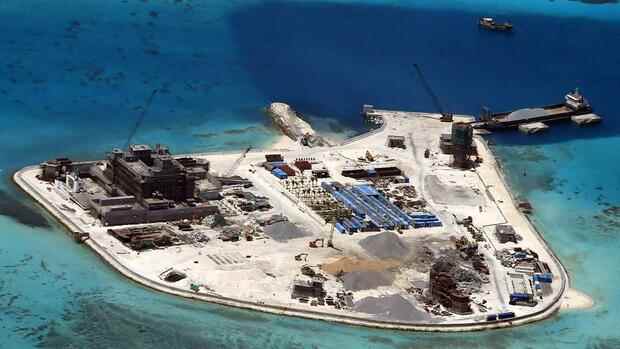Deep disappointment in international relations could hardly sound clearer: “I’m angry,” says French Foreign Minister Jean-Yves Le Drian. “You don’t do that among allies.” And he’s right.
With the agreement on the delivery of nuclear-powered submarines from the USA to Australia as part of the proudly announced new security alliance Aukus, US President Joe Biden disembarks the European partner France. Without warning. Regardless of a contract according to which France should have delivered twelve conventional submarines to Australia with an order value of 56 billion euros.
This is also a clear signal for Germany: it is almost symbolically clear how quickly Europe – the tiny one on the sidelines – is being passed over in the geopolitical conflict between the USA and China.
The EU can present an Indo-Pacific strategy, the Bundeswehr may send a warship into the South China Sea: Europe is a dwarf in the Indo-Pacific. And the US lets the Europeans feel it. In competition with China, Biden focuses on the trans-Pacific partners, not the transatlantic ones.
Top jobs of the day
Find the best jobs now and
be notified by email.
There is no going back to the old transatlantic relationship
It is a development that began under Biden’s predecessor, Barack Obama. The transatlantic relationship will never be the same again. The new federal government must take this as a determinant of its foreign policy.
The geopolitically important South China Sea, with territorial disputes and China’s clear desire for expansion, is one of the potentially most dangerous conflict regions in the world in the future. Can you blame Australia for slipping under the US protective umbrella – and possibly having to make recourse payments to France? It is also understandable that Joe Biden therefore wants to strengthen the alliance with Australia and intensify security policy cooperation with India, Japan and Australia in the alliance of the so-called quad states.
It is remarkable that the diplomatically experienced Biden offends France as the only EU member to be taken seriously militarily. It shows how much US policy focus has narrowed on containing China and perhaps even more on US defense jobs. And how much this pushes the European partners to the brink of consideration.
Officially, the government in Paris feels “pushed aside”. The “brutal, one-sided and unpredictable decision” Biden is reminiscent of the actions of his predecessor Donald Trump, says the French foreign minister angrily. Under French President Emmanuel Macron, France’s transatlantic relationship was not the best even after Biden took office. Now it can officially be considered encumbered.
The EU states must become more geopolitical and more cohesive
The correct conclusion of the European states should be to strengthen the geopolitical ability of the EU to act and to diversify strategic alliances of Europe – without weakening the community of values that still exists with the USA. But following the US blindly cannot be the strategy either.
The states of the European Union must become geopolitically more weighty, more united and more influential. There is often talk of “European sovereignty” these days, a term that is still vague.
On the one hand, the EU must make better use of its economic power with an economic power of more than 13 trillion euros and almost 450 million consumers. It can only do this if it speaks with one voice to foreign partners – on economic, foreign and defense policy matters.
In order to transform the cacophony of the 27 into a voice that makes itself heard, many heads of state and government have to coordinate their foreign policy more closely. Macron’s friendliness towards Russia, the opposing strategy in Paris and Berlin in the gas dispute between Turkey and Greece and the extremely different nuances in the EU countries’ China policy are just a few examples of the fact that there is still a long way to go.
Opposing the Chinese Silk Road Initiative with its own infrastructure program and thus showing Europe’s power in development policy is a good step, but it is not enough. The European states have to ally themselves more closely with like-minded nations such as Japan, South Korea and, yes, actually also with Australia. In economic and technology policy, for example. Neither the USA nor China should simply leave the field here.
We live in an Asian century. It’s not European, but neither is it American. That must determine European foreign policy more in the future.
More: “Cold War mentality” – nuclear submarine deal puts Australia at the center of the confrontation with China
.
